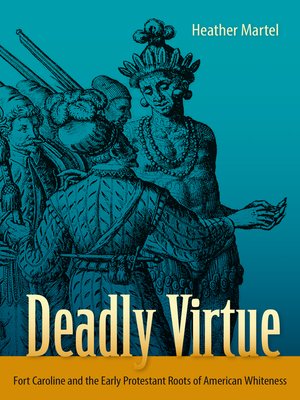Deadly Virtue
ebook ∣ Fort Caroline and the Early Protestant Roots of American Whiteness
By Heather Martel

Sign up to save your library
With an OverDrive account, you can save your favorite libraries for at-a-glance information about availability. Find out more about OverDrive accounts.
Find this title in Libby, the library reading app by OverDrive.



Search for a digital library with this title
Title found at these libraries:
| Library Name | Distance |
|---|---|
| Loading... |
In Deadly Virtue, Heather Martel argues that the French Protestant attempt to colonize Florida in the 1560s significantly shaped the developing concept of race in sixteenth-century America. Telling the story of the short-lived French settlement of Fort Caroline in what is now Jacksonville, Florida, Martel reveals how race, gender, sexuality, and Christian morality intersected to form the foundations of modern understandings of whiteness. Equipped with Calvinist theology and humoral science, an ancient theory that the human body is subject to physical change based on one's emotions and environment, French settlers believed their Christian love could transform the cultural, spiritual, and political allegiances of Indigenous people. But their conversion efforts failed when the colony was wiped out by the Spanish. Martel explains that the French took this misfortune as a sign of God's displeasure with their collaborative ideals, and from this historical moment she traces the growth of separatist colonial strategies. Through the logic of Calvinist predestination, Martel argues, colonists came to believe that white, Christian bodies were beautiful, virtuous, entitled to wealth, and chosen by God. The history of Fort Caroline offers a key to understanding the resonances between religious morality and white supremacy in America today.







